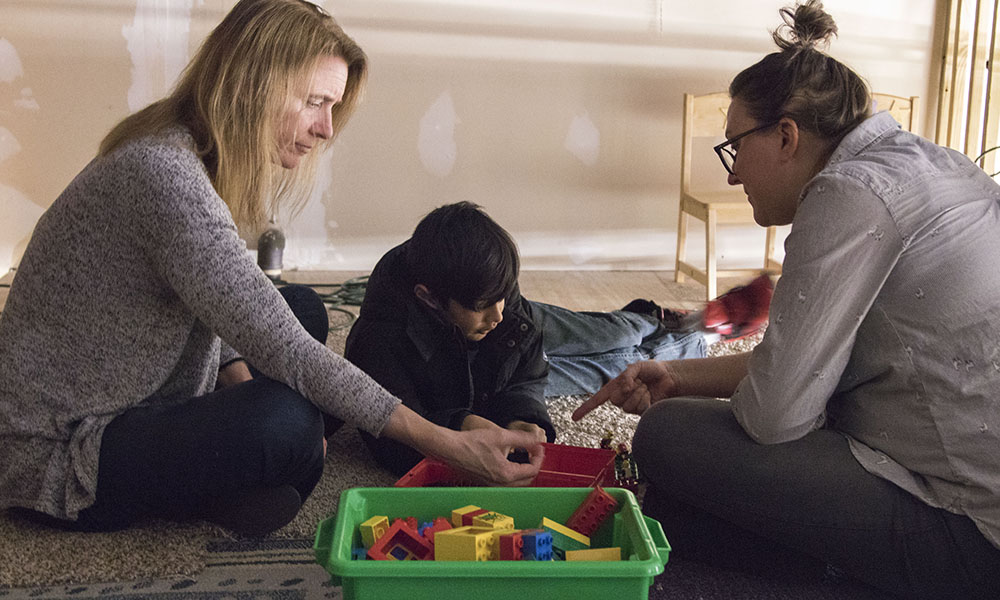JMU OTs present research at VOTA conference
NewsBy: Shannon Shevlin
Creative Services Student Writer

How can OTs support wellness beyond the physical condition? Recent graduate Michelle Bloomfield (’16) and OT program faculty member and field work coordinator Elizabeth Richardson are committed to incorporating mental health care throughout their teaching and practice. Their work suggest OTs are most effective when they feel confident in their ability to provide holistic care, reflecting an understanding of mental health issues and sensitivity to a patient’s exposure to traumatic experiences. Richardson and Bloomfield were selected to present their ideas about building self-efficacy among OTs in trauma-informed care at the 2018 Virginia Occupational Therapy Association (VOTA) annual conference. Their presentation inspired a meaningful discussion about how the field can achieve better outcomes when professionals choose an integrative approach to care.
Richardson has been at JMU since she enrolled as an undergraduate student. She earned her B.S. in health sciences, with a concentration in OT in 2002, and M.S. in Health Sciences in 2007. Richardson joined the faculty in 2006. In her role as OT fieldwork coordinator, she places students in diverse OT settings to engage intensive experiential learning. In addition, Richardson has served as director of Occupational Therapy Clinical Education Services (OTCES) since its inception in 2010. In this role, Richardson enjoys providing occupational therapy services to children and families in Harrisonburg while promoting inter-professional collaboration and student development.
While Richardson has vast experience with pediatrics and early-intervention, she is also passionate about improving education and fieldwork programming that helps OT students become successful professionals. She has conducted research on adolescent and child mental health, but recruited her former student Michelle Bloomfield to discuss implications on education and fieldwork.
Bloomfield currently works in Richmond at VCU Health’s Virginia Treatment Center for Children which is an acute inpatient psychiatric facility for children ages 4-18. She provides OT services to children and families affected by trauma and mental illness, while providing educational resources and expanding access to psychiatric services. Bloomfield is passionate about holistic approaches to healthcare, and was excited about the opportunity to further explore how OTs improve their competencies in caring for clients with diverse needs.
Richardson further emphasized that mental health information should not be isolated to just one semester in the curriculum, but should be integrated throughout all courses. She said, “It has to start with [OT] education programs. Students need to be learning how to model behavior and develop these skills in the classroom.”
Understanding unique needs for people who have experienced severe distress is an important step in improving a therapist’s effectiveness in delivering quality care. Bloomfield mentioned emerging research from the CDC’s Adverse Childhood Experiences (ACE) score studies which have not only informed her presentation with Richardson, but also improved her efficacy in practice. ACE scores measure the effects of abuse, neglect and household dysfunction on later physical and emotional health. Those with higher ACE scores are at risk for a variety of chronic adult conditions ranging from increased headaches and depression to heart disease and cancer. In addition, individuals with higher ACE scores are more likely to engage in risky behaviors like smoking and substance abuse.
Those who have experienced trauma need environments and opportunities to regain their sense of safety, competence and connection to others and OTs are in a unique position to help. Through interdisciplinary collaboration, OTs achieve trauma-informed care when they recognize the signs and symptoms of trauma and teach patients skills that promote self-control and resilience. By being mindful of trauma and sensitive to its impact, OTs can be more successful in restoring independence in the lives of others.
Bloomfield said, “This is what evidence-based practice means. We want to use lessons from research to understand challenges and adjust the ways we teach and practice.” She continued, “People are shaped beyond what we can see. Meeting people where they are and seeing them as a whole person – rather than just the injury or condition they’ve endured – is fundamental to OT.”

